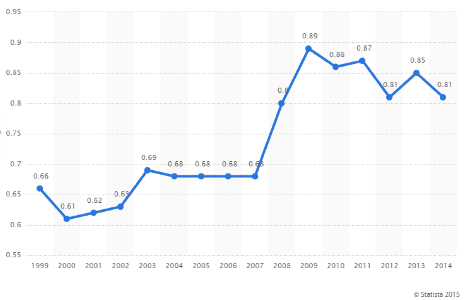Jeremy Corbyn, the front runner in Labour’s leadership race, is clearly somebody that mainstream politicians and media types underestimate. The standard criticism of him is that he a blast form the past – somebody that wants to take the country back to the failed solutions of the 1970s. No doubt that’s how it looks if you just examine the various things the man has said down the years. But many of his supporters are young and are projecting something quite different onto him. He has crafted his message to appeal to this group, to look like something much more modern. Today I want to take look at his economic ideas.
These have been set out in greatest detail in his paper The Economy in 2020, published on 22 July. It isn’t hard to see why he is enjoying so much support. He offers the hope of something fresh. He starts by attacking the government’s economic policies, which he characterises as “austerity” in the now familiar language of the left. Thankfully he has shown more sense than to use the word “neoliberal”, putting him ahead of the Green leader, Natalie Bennett, who put forward a strikingly similar prospectus in the May General Election.
“Austerity” is used as a general shorthand for economic liberalism, and in particular the attempt to keep government expenditure and taxation in check – which at present means reducing the scale of government expenditure. It also refers to attempts to reform public services through such policies as privatisation. Instead Mr Corbyn calls for investment to rebalance the economy towards higher paying jobs, though not ones in financial services. He has time for some supportive words for private industry – recognising that private enterprise will have to be part of the growth and investment process. It reads as constructive and hopeful.
This overarching narrative has some macroeconomic credibility. The current British economy is nothing like as strong as the government claims, and many of his criticisms are on the mark. Alas it falls apart on closer scrutiny. I want to quickly look at three aspects in particular: the so-called tax gap of £120bn, corporate subsidies of £93bn, and the idea of “people’s QE”.
But first I must mention a name that keeps popping up, and who ideas seem to be behind much of the document: Richard Murphy, an activist associated with the Tax Justice Movement. There are some striking parallels between Mr Murphy and me: he was born in 1958, he took an economics degree, and he is a Chartered Accountant. The main difference was that his Economics degree was joint Economics and Accountancy (at Southampton) in the 1970s, and mine was full Economics (at UCL) in the 2000s. It is one of the rare occasions when my formal qualifications in economics outrank that of a public policy wonk.
The Tax Gap estimate comes from this paper commissioned by the Public and Commercial Services Union and written by Richard Murphy in 2014. Mr Murphy (like me born in 1958 and a Chartered Accountant) is a prominent campaigner for Tax Justice. I first came across this document when it featured in a 38 Degrees campaign (“it isn’t rocket science”, which suggested that collecting more tax was basically quite easy), and I think its claims are firmly embedded in the hard left mythology. It suggests that the Revenue & Customs vastly underestimates the amount of tax lost through avoidance, evasion and the like – and that the real gap is £120bn and not £35bn (and falling). This is important because it suggests that a huge amount of extra tax could be collected if only politicians were less indulgent of wealthy taxpayers. To give some context, the Lib Dems were criticised in the General election for being speculative when they suggested that £10bn cold be gained by tackling the tax gap (more than the other parties, except the Greens, of course). Mr Corbyn has his eyes on something much grander – and thus funding extra government spending without raising taxes on ordinary working people.
The biggest part of this gap is the untaxed shadow economy, which Mr Murphy says is much bigger than official estimates. I can’t offer an opinion on whether this is true – but I can suggest that this is hardly low hanging fruit, and is by no means confined to fat cats (think small building jobs, domestic cleaners, to say nothing of drug dealers and the smuggling of booze and fags). This does explain a rather tangential reference to cracking down on small business tax evasion though in Mr Corbyn’s document. It is hard to see how any government could do much more than make a marginal difference without a draconian clampdown on the black and grey economies which would carry a lot of uncomfortable implications right across our society.
Another number that gets an airing is the idea the government subsidises business to the tune of £93bn. The source of that seems to be the Guardian newspaper, and its correspondent Adtiya Chakrabortty (“The 93bn handshake” is their headline). This is unbelievably flaky. The biggest single item is £44bn of corporate tax benefits. This is mainly credits for investment expenditure. Calling this a subsidy is more than a stretch – it is simply putting capital expenditure on a level playing field with revenue expenditure by, in effect, making depreciation tax-deductible on some types of investment. I’m not clear whether the figure includes tax releif for research and development, but that would be entirely consistent with the logic. If Labour is serious about helping manufacturing industry, it will need more of this sort of thing, not less. Another thing thrown into the pot is export credits, which allow British exporters to compete on a level playing field. If George Osborne abolished this the noise from Labour benches would be deafening. Cleaning up old nuclear power stations is in there too. There is something not a little bizarre in on the one hand suggesting that the government should promote investment, and on the other hand attacking all attempts by government to promote private sector investment as corporate welfare that should be stopped.
Next comes the idea that the Bank of England’s Quantitative Easing (QE) programme should focus on public investment in housing and infrastructure and the like – “People’s QE” – rather than buying government and other bonds. This is promoted by Mr Murphy again (his ideas pop up several times – and not all of them are bad), in spite of his lack of economic qualifications. Quite apart form the fact that the Bank of England has ended QE because the monetary conditions no longer apply, it gets the Bank into the unenviable position of evaluating public investment projects. Getting unelected technocrats to do this sort of thing rather than government ministers (funded by gilts subject to QE) is hardly democratic either. To be fair, Mr Corbyn just says that the idea should be looked at, not that he would do it. But it betrays a very weak understanding of economics. He seems unaware that the Keynesian critique of austerity is weakening all the time, especially now that real wage increases are growing, suggesting that economic slack has been taken up. The Keynesian critique may have had authority in 2010, but 2015 is another matter.
The truth about the modern economy is this: the world has moved on from the easy textbook world of the 1960s, and even the 1990s. Technology has made manufacturing so efficient that there are few jobs in it any more; most white collar jobs have likewise been automated away; we are left with a lot of important jobs (carers, nurses, cleaners, etc.) that cannot be made more productive (and so better paid) through investment programmes. Some things can and should be done: investing in public housing, rail infrastructure and building up renewable energy, for example. But these will not yield the hordes of well-paid jobs that politicians left and right so badly want. Productivity improvement has moved from the workplace to our private lives (think smartphones and search engines). And you can’t tax that. Meanwhile demographic change is adding a further brake to the formal economy. This is the real reason why the economy under the Conservatives is not doing well, not “austerity”. Mr Corbyn is offering 20th Century solutions to a 21st Century problem (as is George Osborne, the Conservative Chancellor, I must add).
Slower growth means that it will be a struggle to raise much more in taxes, and certainly not without increasing taxes on middle income people. That is a hard political sell that Mr Corbyn only hints at (“there will be hard choices” he manages at one point). And it means that the government can’t just keep adding things to public expenditure without public services being unable to keep up with demand. That’s why abolishing student tuition fees is such a bad idea, for example – you only have to look at Scotland, where the state pays for university education, to see that. The universities can’t keep pace with demand, and fewer people from poorer backgrounds go to university than in England as a result.
I believe that there is a way forward from here. It does not come from the current government’s economic liberalism. It comes from strengthening local communities and the small businesses that serve them. It will not necessarily produce lots of conventional economic growth, and it will not produce masses of new tax. But it might produce public services that don’t keep failing; it would stop national and multinational chains sucking the life out of local economies; it would harness the potential of the underemployed.
Some of the ideas Mr Corbyn is promoting might help; he seems to suggest devolution of power to centres away from London. But too many look like national solutions that draw power back to London; others look like a path towards mass surveillance in order to collect more tax. I cannot see that it is any better than what the Tories are doing – and frankly I fear it would be worse.
Mr Corbyn promises hope, but his ideas are built partly on fantasy and definitely on shaky foundations. And that is even before he attempts to convince the public at large.




